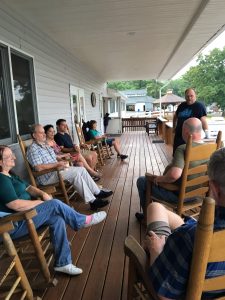 1 Samuel 7:2-13
1 Samuel 7:2-13
Then all the people of Israel turned back to the Lord (7:2 NIV).
Back in the days when we lived where there was sufficient snow cover, Sharon and I would ski, cross-country style. One place we skied was in the Charleston State Forest, which had twenty some miles of ski trails cut in it. In the north section in one area, the trail ran through a long avenue of pine trees. With a couple of feet of snow on the ground, it was a beautiful sight. We would stop at different points to admire the scene.
Picture in your mind a long avenue of evergreen trees. You might be skiing or walking or driving down it. As you travel down this green avenue, you stop along it to admire the view. You look back to what you have already traveled, and are grateful for what you have seen. Your stopping point seems calm and peaceful, and you are glad. Then you turn to look forward. New views await, but some parts look challenging. You think, “The trail goes up, so the way will be harder, but then the view might be better!” And you move on. Our walk with God is similar. Let us look at a passage to help us in this matter.
Our spiritual journey with God involves our repentance (7:2-6). For twenty years, the ark of the covenant had been separated from the tabernacle. Worship of God had been disrupted. No one seemed to care. Unexpectedly, the hearts of God’s people turned back to the Lord (7:2). It was a general revival. Behind this was the Holy Spirit. Nothing else explains this situation. He stirs people’s hearts, so that they are dissatisfied and feel that God is missing in their lives. His action causes the people to sorrow. “Life is not right; we need the living God among us. How can we return to God?” Compare Psalm 42:2-4. People in our time are dissatisfied, though they are far from thinking that the problem is the absence of God. “Lostness” gnaws at their souls, as they seek hope in a new year. But they suppress the knowledge of God. If you understand, weep for our generation!
Into this dark setting, God sent Samuel to preach (7:3). He recognized what was happening and seized the opportunity to give them hope. Consider four elements of his preaching:
- Samuel told them to turn away from their false gods. The Baals and Ashtoreths (notice that both are in the plural, 7:4) were Canaanite fertility gods and goddesses. As you need not imagine, the worship of them was vile and degrading. Yes, they knew about sexual immorality in ancient times and were sophisticated enough to make it part of worship. And you thought times were bad now! Don’t be surprised at the next step of debauchery you hear of. Humanity has already been there.
- Samuel told them to make it their business to return to the Lord. Interestingly, to return to the Lord means to serve him, which is also a very new covenant concept (1 Thessalonians 1:9). A true return to the Lord makes us recover a proper Creator/creature relationship and a desire to do what pleases God.
- Samuel told them that they must be wholly for God: “serve him only”. The fashion of ancient times and postmodern times is pluralism. Hmm, we have advanced to the past! But true Christianity is exclusive. Whatever others may do, we affirm the reality of one true God (Ephesians 4:6).
- Samuel told them that this was the only sure way to recovery. They had lived for years in oppression, but God was not about to help unless they really repented.
This is always unpopular preaching. It upsets people. But if you’ve ever remodeled, you know that you usually must rip out rotten material and make a mess to improve the situation. Most people only want to be happy, today and everyday, with no interruptions. Sadly, they sacrifice eternal joy for temporary happiness.
We can detect the fruits of true repentance (7:4-6).
- Their change of mind caused them to put away their false gods. They made a clean, radical break. There is a time to burn the bridges to hinder any return to your old way of life. Do you have any bridges you need to burn right now? If there are items you know you need to get rid of, throw them in the trash today. Change comes from a believing heart, but it expresses itself in the fruits of repentance.
- They acknowledged God in their public assembly. Fasting and pouring out water were used on various occasions in old covenant times to illustrate zeal and consciousness of the need for cleansing.
- They confessed their sin. “We have sinned against the Lord.” They stated their sin in its true colors; it was against the Lord.
The Lord God encourages us to walk with him this year. The path will look difficult, but with his Spirit and help, we can overcome the challenges that will appear. Let’s learn from this incident in the life of God’s people.
Grace and peace, David

 When the Lord gives us the new birth from above, he calls us individually to himself. However, he does not save us to be individuals, but to belong to his people, his new family. In this way, our lives are forever intertwined, not only with the Triune God, but with each other!
When the Lord gives us the new birth from above, he calls us individually to himself. However, he does not save us to be individuals, but to belong to his people, his new family. In this way, our lives are forever intertwined, not only with the Triune God, but with each other! Ruth 1:16-18
Ruth 1:16-18 Ruth 1:16-18
Ruth 1:16-18